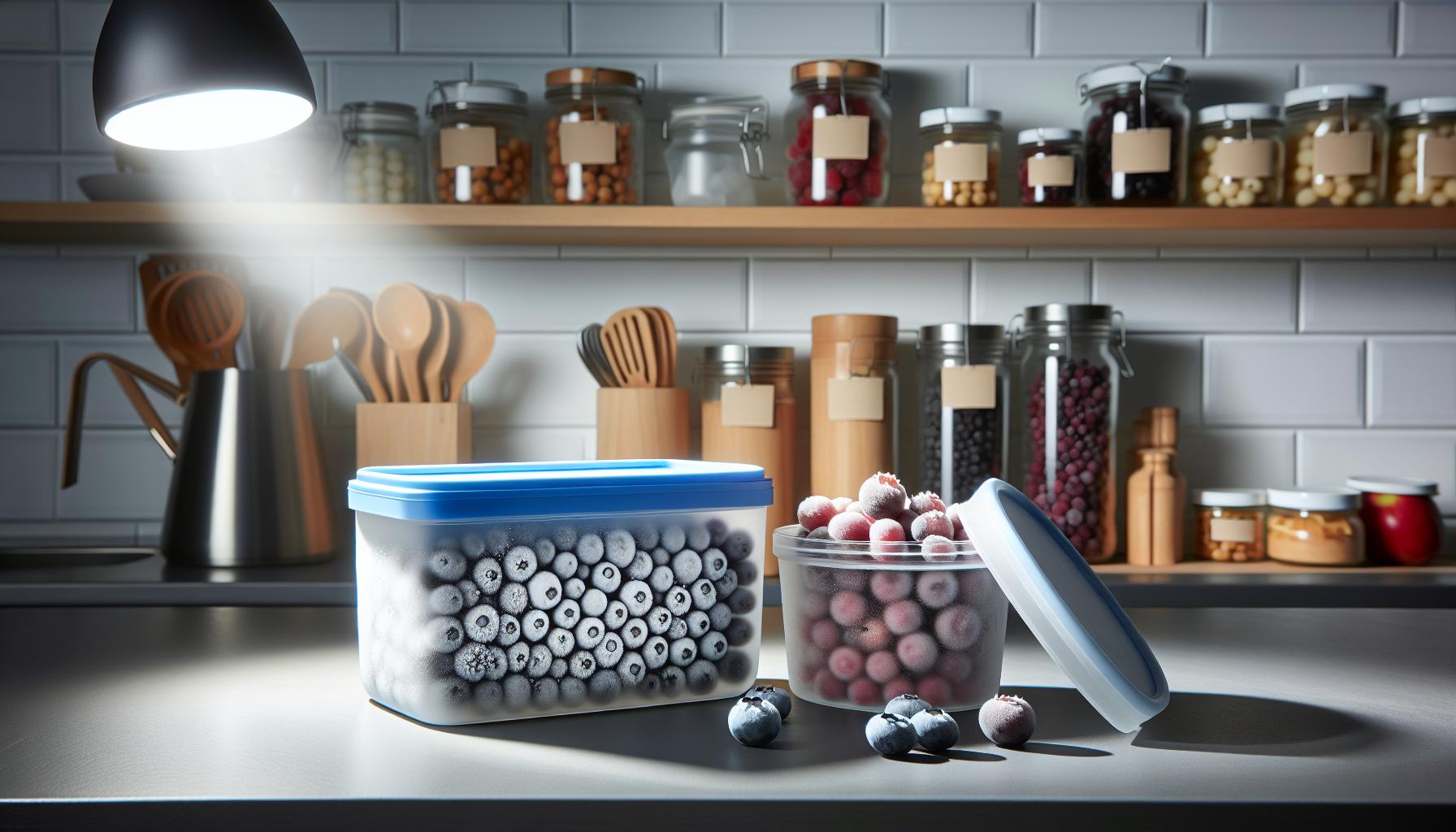Did you know that freezing blueberries can preserve their freshness for up to a year? This delicious superfood is not only packed with antioxidants but also offers a burst of flavor that can brighten up any dish. Knowing how long blueberries last in the freezer is essential for maximizing their benefits and minimizing waste.
Whether you’re a smoothie enthusiast or a baking aficionado, having a stash of frozen blueberries at your fingertips allows you to enjoy their nutritious goodness year-round. However, understanding proper storage techniques and shelf life can help you avoid flavor loss or spoilage.
In this article, we’ll dive into the best practices for freezing blueberries and offer insights on how long you can safely keep them in your freezer. With these guidelines, you can confidently stock up on this delightful fruit and savor its health benefits throughout the seasons. Keep reading to unlock the secrets to enjoying blueberries at their best!
How Freezing Affects Blueberry Freshness
Freezing blueberries is an excellent way to preserve their freshness and nutritional benefits, allowing you to enjoy these delicious berries year-round. When properly frozen, blueberries retain much of their flavor, texture, and nutrients, making them an ideal choice for future use in smoothies, baking, and snacking. However, the freezing process does have an impact on their freshness and quality.
When blueberries are frozen, the water inside the fruit expands and forms ice crystals. This can cause the cell walls of the berries to break down slightly, leading to a softer texture once thawed. While this alteration in texture might not be noticeable in recipes where blueberries are blended or cooked, it can be significant if the berries are intended for fresh eating. To counteract this, proper freezing methods can help maintain their firmness. For instance, freezing berries quickly in a single layer before transferring them to a container can limit the formation of larger ice crystals, preserving better texture.
The ideal freezing temperature for blueberries is 0°F (-18°C) or lower. This temperature prevents the growth of bacteria, yeast, and mold, ensuring that the fruit stays safe for consumption. It’s important to use airtight containers or freezer bags to minimize air exposure, which can cause freezer burn and degrade the flavor over time. Vacuum sealing is a particularly effective method of packaging frozen blueberries, as it removes air completely and extends their freshness.
In summary, freezing blueberries can significantly preserve their freshness and health benefits, but the process can alter their texture. By using proper storage techniques, including quick freezing and airtight packaging, you can enjoy the delightful flavor and nutritional profile of blueberries long after their harvest season.
Ideal Storage Conditions for Frozen Blueberries
To maintain the quality and freshness of frozen blueberries, specific storage conditions are paramount. Ensuring that these berries are stored correctly can significantly extend their shelf life and preserve their deliciousness for a longer period. Here’s how to achieve the best storage conditions for your frozen blueberries.
First and foremost, blueberries should be stored at a steady temperature of 0°F (-18°C) or lower. This temperature halts bacterial growth, preserving the fruit’s safety and quality. Use a dedicated freezer if possible, as frequent door openings in a conventional refrigerator freezer can lead to temperature fluctuations that affect stored food. Additionally, maintaining an organized freezer with minimal airflow is crucial; consider a chest freezer for optimal storage conditions.
When it comes to packaging, airtight containers or heavy-duty freezer bags are essential. They prevent exposure to air, which can cause freezer burn-a common issue that leads to texture and flavor degradation. Role models in packaging include vacuum-sealed bags, which remove air entirely, significantly reducing the chance of freezer burn and extending freshness. For extra protection, consider lining bags or containers with parchment paper before sealing, which can also help in minimizing ice crystal formation.
Before freezing, it is beneficial to flash freeze the blueberries by spreading them in a single layer on a baking sheet. This method allows each berry to freeze individually, inhibiting the formation of large ice crystals which can rupture cell walls, compromising texture. Once frozen, transfer the berries to your chosen packaging while ensuring to remove as much air as possible. Label the packaging with dates to keep track of freshness; blueberries retain their best quality in the freezer for up to 12 months.
Remember, once you have frozen your blueberries, avoid refreezing them after they have been thawed. This can lead to mushy texture and loss of flavor. For optimal enjoyment, only thaw the amount you plan to use at a time. By following these storage guidelines, you can ensure your blueberries maintain their flavor and nutritional benefits, allowing you to enjoy them long after the harvest season.
How Long Do Blueberries Last in the Freezer?
Blueberries are an incredibly versatile fruit that can brighten up a dish any time of the year, but how long can you expect them to last in the freezer? When stored under optimal conditions, frozen blueberries can maintain their quality for an impressive duration, ensuring you enjoy their sweet, tart flavor months after the harvest season.
Typically, frozen blueberries can retain their best quality for up to 12 months if kept at a consistent temperature of 0°F (-18°C) or lower. Beyond this timeframe, while they may still be safe to eat, you might notice a decline in texture and flavor. Freezing preserves the nutrients in blueberries, making them a great option for smoothies, desserts, and baking throughout the year.
To maximize their freshness, it’s advisable to label your storage containers or freezer bags with the date of freezing. This simple habit allows you to keep track of how long they’ve been stored, helping you use the older ones first. Additionally, always remember that once thawed, blueberries should not be refrozen, as this can lead to a mushy texture that diminishes the fruit’s appeal. Enjoying blueberries at their peak quality means being mindful of storage times and methods, turning your freezer into a reliable source of this beloved fruit all year round.
Signs Your Frozen Blueberries Have Spoiled
Frozen blueberries are a delightful and nutritious treat, but it’s essential to ensure they haven’t spoiled before you enjoy them. Spoiled blueberries may not only compromise the taste of your dishes but could also pose health risks. Here’s how to recognize signs of spoilage in your frozen berries.
One of the first indicators that your blueberries have gone bad is a significant change in color. Fresh, healthy frozen blueberries should maintain their deep blue hue. If you notice that the berries have developed a dull, faded appearance or an unusual color-such as brown or black spots-this could signify spoilage. Additionally, a dry or shriveled texture can indicate that the blueberries have lost their freshness or had prolonged exposure to air.
Another telltale sign is the formation of ice crystals inside the storage container. While some ice crystals are normal, a significant buildup of ice can indicate that the blueberries have been stored improperly or have been subject to thawing and refreezing. This can affect the texture and flavor, making them less enjoyable.
When you take the berries out for use, always give them a sniff. Fresh blueberries should smell pleasant and fruity. A sour or off odor is a red flag, suggesting that the fruit may have begun to ferment or spoil. If the odor is displeasing, it’s best to discard the blueberries.
Lastly, if you unfreeze the blueberries and they feel excessively mushy or watery, this may indicate that they have been stored beyond their prime or that they are no longer safe to eat. In such cases, trust your senses-if something seems off, it’s better to err on the side of caution and dispose of the fruit. Keeping these signs in mind will help you enjoy your frozen blueberries safely and deliciously.
Step-by-Step Guide to Freezing Blueberries
To enjoy the vibrant taste of blueberries all year round, freezing them correctly is essential. One effective method of preserving blueberries ensures their freshness, flavor, and nutritional benefits. Here’s a straightforward step-by-step guide to help you freeze blueberries successfully.
Start by selecting fresh, ripe blueberries. Look for berries that are plump, firm, and free from blemishes. Rinse them gently under cool water to remove any dirt, and then pat them dry with a clean cloth or paper towel. This is crucial as excess moisture can lead to ice crystals forming during freezing, which can affect the texture and quality of the berries.
Next, lay the cleaned blueberries in a single layer on a baking sheet lined with parchment paper. This method, known as flash freezing, allows the berries to freeze individually, preventing them from sticking together. Place the baking sheet in the freezer for about two to three hours, or until the blueberries are solid.
Once frozen, transfer the blueberries into airtight containers or freezer bags, making sure to remove as much air as possible to avoid freezer burn. Label the containers with the date so you can keep track of their freshness. For optimal quality, frozen blueberries can last up to 10 to 12 months in the freezer.
By following these steps, you can maintain the delightful taste and nutritional value of blueberries, ensuring they remain a convenient and healthy addition to your meals and snacks any time of the year. Whether you toss them into smoothies, bake them into muffins, or enjoy them as a frozen treat, your properly frozen blueberries are ready to provide bursts of flavor and antioxidants whenever you need them.
Best Practices for Thawing Frozen Blueberries
When it comes to thawing frozen blueberries, adopting the right approach can significantly enhance their flavor, texture, and overall quality. Thawing can influence how well the berries retain their shape and juiciness, making proper techniques essential for maintaining their delightful characteristics. Here are some best practices to ensure that your thawed blueberries are as fresh and delicious as the day you froze them.
One effective method is to thaw the blueberries gradually in the refrigerator. Simply transfer the desired amount of frozen blueberries from the freezer to a bowl or container and place them in the refrigerator for several hours or overnight. This method prevents the berries from becoming soggy, as it allows moisture to escape slowly. Not only does this maintain their structure better, but it also preserves their vibrant color and nutritional value.
If you need to thaw blueberries more quickly, using a microwave is another option. Place the frozen blueberries in a microwave-safe bowl and use the defrost setting, ensuring you pause every 15-20 seconds to check the berries and stir them gently. Be cautious to avoid cooking the berries, as this can compromise their quality.
Alternatively, you can incorporate frozen blueberries directly into recipes, which eliminates the need to thaw them beforehand. For instance, when making smoothies or pancakes, toss the frozen berries straight into the blender or batter. They will thaw quickly during the cooking or blending process, allowing you to enjoy their freshness without any extra steps.
Regardless of the method chosen, it’s essential to use thawed blueberries within 3 to 5 days for optimal taste and safety. Always inspect thawed berries for any signs of spoilage, such as off odors or excessive mushiness, before using them. By following these thawing practices, you not only ensure a delightful eating experience but also make the most of your frozen blueberry stash throughout the year.
Creative Ways to Use Frozen Blueberries
Frozen blueberries are a versatile ingredient that can elevate a variety of dishes while providing a wealth of flavor and nutrition year-round. The beauty of frozen blueberries is not just in their convenience but also in the multitude of creative ways they can be used, ensuring you get the most out of your frozen stash.
One of the simplest ways to incorporate frozen blueberries is by adding them to breakfast items. Toss a handful of these vibrant berries into your morning oatmeal or yogurt to enhance flavor and add a burst of color. They can also be blended into smoothies, lending a natural sweetness and a gorgeous purple hue. For those who love baking, frozen blueberries are perfect for muffins and pancakes. They retain their shape and flavor beautifully when mixed into batter, delivering juicy, flavorful bites with every bite.
Frozen blueberries also contribute wonderfully to savory dishes. Consider adding them to salads for a surprising twist-pair them with mixed greens, goat cheese, and walnuts for a refreshing summer meal. They can also be cooked down into sauces or glazes for meats, such as chicken or pork, creating an appealing contrast that balances sweetness and acidity perfectly.
Don’t forget about their versatility in desserts! Frozen blueberries can easily be turned into homemade ice cream or sorbet without the hassle of cooking down fresh fruit. Simply blend them with a little sweetener and your choice of cream or yogurt for a refreshing treat. Additionally, you can use them in pie fillings, cobblers, or crumbles; their natural sweetness and juiciness make them an excellent choice for baking.
Incorporating frozen blueberries into your meals not only enhances flavor but also allows you to enjoy their nutritional benefits. Rich in antioxidants, fiber, and vitamins, these berries are a smart choice to boost your diet. So, feel confident in exploring various culinary avenues with your frozen blueberries, and ensure you utilize them creatively to savor their benefits and deliciousness all year round.
Nutritional Benefits of Frozen Blueberries
Frozen blueberries are not only a convenient option for year-round enjoyment, but they also pack a nutritional punch that makes them a valuable addition to your diet. Retaining most of their nutrients during the freezing process, these delightful berries offer a myriad of health benefits. Their high antioxidant content is one of their most notable attributes. Antioxidants help combat oxidative stress in the body, which can reduce the risk of chronic diseases and support overall health.
In addition to antioxidants, frozen blueberries are an excellent source of dietary fiber. Consuming fiber is essential for digestive health, aiding in regularity and preventing constipation. Including frozen blueberries in your meals can significantly contribute to your daily fiber intake. Just one cup of blueberries offers about 4 grams of fiber, making them a delicious way to help you meet your dietary needs.
Furthermore, these berries are low in calories but high in various vitamins and minerals. They provide significant amounts of vitamin C, which plays a crucial role in immune function and skin health; vitamin K, important for bone health and blood clotting; and manganese, which contributes to metabolism and bone formation. The nutritional profile of frozen blueberries makes them an ideal ingredient for anyone looking to enhance their meals while reaping the benefits of wholesome, nutrient-dense food.
To incorporate frozen blueberries into your diet effectively, consider adding them to smoothies, yogurt, or cereals for a nutritious breakfast. You can also use them in baking, where they not only add moisture and flavor but also retain much of their nutritional value even after cooking. Thus, you can enjoy their benefits in numerous creative and delicious ways while ensuring that your meals remain healthful and balanced.
Comparing Freezing vs. Canning Blueberries
Choosing between freezing and canning blueberries can significantly impact their flavor, texture, and nutritional quality. Freezing is a simpler and often preferable method for preserving these berries, as it helps maintain their freshness and nutritional content. When frozen, blueberries retain almost all their natural antioxidants, vitamins, and minerals, making them a healthy option for year-round consumption. In contrast, canning involves a cooking process that can alter the berries’ delicate texture and flavor while potentially reducing some of their nutrient levels.
One critical advantage of freezing is the preservation of freshness. Unlike canning, which often leads to a softer texture due to high heat, frozen blueberries maintain a firm and juicy quality, making them ideal for use in smoothies, baked goods, or as toppings. Additionally, freezing is a straightforward process that requires minimal preparation: simply wash, dry, and freeze the berries in a single layer before transferring them to airtight containers. This method ensures that each berry remains separate, preventing the clumping that can occur when freezing large quantities together.
Storage Longevity
Freezing extends the shelf life of blueberries for up to 10 to 12 months, allowing you to enjoy these fruits well beyond their typical harvest season. Canned blueberries, while also shelf-stable, generally last for about 1 to 2 years. However, once a can is opened, the contents should be consumed within a week to ensure safety and quality. Hence, if you plan to use the blueberries soon, freezing them might be the best choice.
- Freezing: Up to 10-12 months
- Canning: 1-2 years (opened can should be used within a week)
Ultimately, while both methods have their merits, freezing blueberries tends to be the favored approach for those seeking to maximize flavor, texture, and nutrient retention. Whether you opt for frozen or canned, understanding the differences will help you make informed decisions that align with your tastes and storage capabilities.
Tips for Long-Term Blueberry Storage
To maximize the longevity and quality of frozen blueberries, it’s essential to follow some practical storage guidelines. Proper storage not only extends their shelf life but also preserves their flavor, texture, and nutritional value, allowing you to enjoy fresh tasting blueberries throughout the year.
Start by choosing the right kind of container for freezing. Airtight containers or heavy-duty freezer bags are ideal to prevent freezer burn and moisture loss. Remove as much air as possible from freezer bags, and store them laying flat for efficient space utilization. If using containers, fill them to the brim to minimize air exposure. Label each container with the date of freezing; this will help you keep track of their freshness and rotation.
It’s worth noting that while frozen blueberries can maintain optimal quality for up to 10-12 months, they can remain safe beyond that time if kept at a constant freezing temperature (0°F or -18°C). However, quality may decline. For best results, try to use them within this timeframe. Regularly check your freezer settings and avoid frequently opening the door to maintain a stable temperature.
When it comes to organized storage, consider implementing a first-in, first-out (FIFO) system. Place newer items at the back and older ones in the front to ensure that you use the oldest blueberries first, minimizing waste. This practice helps keep your stock fresh and flavorful.
Frequently Asked Questions About Freezing Blueberries
Freezing blueberries is a smart way to enjoy their freshness and health benefits throughout the year. However, many people have questions about how to properly store and use frozen blueberries to maintain their quality and taste. Here are some common inquiries and their answers regarding freezing blueberries.
- How long do blueberries last in the freezer? Frozen blueberries can maintain their optimal quality for about 10 to 12 months when stored at 0°F (-18°C). While they remain safe indefinitely if kept at this temperature, the texture and flavor may deteriorate after the 12-month mark. It’s best to use them within this timeframe to enjoy the freshest taste.
- What’s the best way to thaw frozen blueberries? The safest method for thawing blueberries is in the refrigerator overnight. This allows them to thaw gradually, preserving their texture and flavor. If you need them quickly, you can also run them under cold water in a colander or use them directly in recipes without thawing, such as smoothies or baked goods.
- Can you refreeze blueberries after thawing? It’s generally not recommended to refreeze blueberries once they have been thawed as this can affect their taste and texture. If they have been thawed in the refrigerator and not used, it is safe to refreeze them, but expect a change in quality.
- What are signs that frozen blueberries have spoiled? Spoiled blueberries may show signs of freezer burn, which appears as white or grayish spots on their surface. They might also develop an off smell or a mushy texture when thawed. If you notice these signs, it’s best to discard them to ensure food safety.
By following these guidelines, you can effectively freeze and thaw blueberries, ensuring you get to enjoy their flavor and nutritional benefits all year round. Proper storage techniques and awareness of signs of spoilage will keep your blueberries delicious and safe.
Faq
Q: How can I tell if frozen blueberries are still good to eat?
A: To determine if frozen blueberries are still good, check for signs of freezer burn, an off smell, or changes in color. If they appear dry or shriveled, they may have lost quality. For safety, always discard any that show signs of spoilage.
Q: Can I freeze blueberries without washing them first?
A: While you can freeze blueberries without washing them first, it’s recommended to rinse and dry them. Washing removes dirt and insects, ensuring better quality. After washing, thoroughly dry your blueberries to prevent ice crystals from forming.
Q: Is it safe to refreeze blueberries after thawing?
A: It’s safe to refreeze blueberries that have been thawed in the refrigerator, not at room temperature. However, repeated thawing and freezing can affect their texture and flavor. For the best quality, use thawed blueberries promptly.
Q: How should I store blueberries in the freezer for maximum freshness?
A: For maximum freshness, store blueberries in airtight freezer bags or containers, removing as much air as possible. Label with the date and consume within six to twelve months for the best taste and quality.
Q: What is the best way to thaw frozen blueberries?
A: The best way to thaw frozen blueberries is in the refrigerator overnight. If you’re short on time, you can rinse them under cold water or microwave them in short intervals. Avoid thawing at room temperature to prevent spoilage.
Q: Can freezing blueberries change their texture?
A: Yes, freezing blueberries can change their texture. They may become softer upon thawing due to the formation of ice crystals that break down cell walls. While the taste remains delicious, the texture may be less firm, ideal for smoothies or baking.
Q: How long do blueberries last in the freezer compared to fresh?
A: Frozen blueberries can last six to twelve months in the freezer, while fresh blueberries typically last about one to two weeks in the refrigerator. Freezing is a great way to extend their shelf life significantly.
Q: Can I use frozen blueberries in baking without thawing them first?
A: Yes, you can use frozen blueberries in baking without thawing them first. This helps maintain their shape and prevents them from bleeding into the batter. Adjust baking time slightly, as they may take longer to cook through.
Concluding Remarks
Now that you know how long blueberries last in the freezer, you can enjoy these nutrient-packed berries all year long! Remember, for optimal freshness, use airtight containers and aim to consume them within six to twelve months. Don’t hesitate to share your experiences or ask questions in the comments below; we love hearing from you! If you’re interested in expanding your knowledge on food preservation, check out our articles on “Best Freezing Practices for Fruits” and “Essential Guide to Freezing Vegetables.”
Take the next step toward delicious and safe food storage by signing up for our newsletter, where we share tips, recipes, and the latest on food science. The best part? You can dive into more content about healthy eating habits and food safety guidelines right here. Embrace the convenience of frozen blueberries and make smart storage choices that enhance your culinary adventures!





